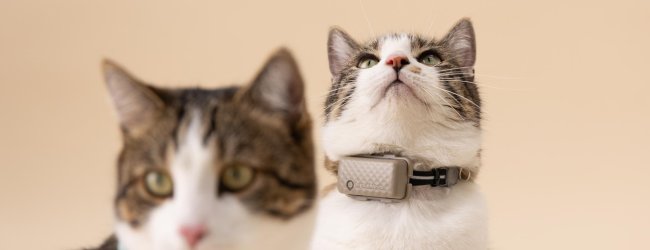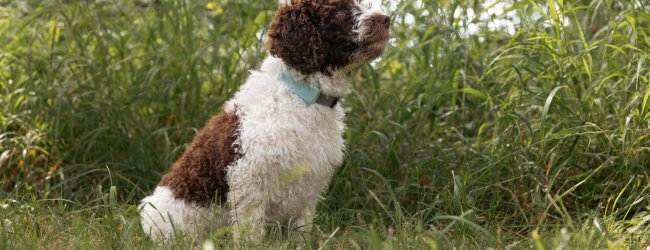Why Do Cats Hiss? Do’s, Don’ts & How to Respond
Your cat hissing is a normal, instinctive behavior - but it can be pretty startling to experience all the same. Here are a couple of reasons why cats hiss - from stating boundaries to showing other cats who's boss.

Ever approached your cat for some cuddles…and they hiss at you? Which can be pretty startling to experience, especially if they were purring contentedly a minute before or just meowing out the window. So you might’ve wondered: why do cats hiss in the first place? And is a hissing cat always a sign that something’s wrong?

Find out where your cat spends their time.
Read moreSo why do cats hiss in the first place?
Cats hiss for a whole bunch of reasons: protecting their boundaries, establishing a pecking order, or expressing stress or even pain. Hissing is a defensive reaction, not aggressive or offensive.1 It means they might be feeling distressed, provoked, uncomfortable, pressured, or threatened. By hissing, your cat is actually indicating that they’re scared and want to avoid a fight.
A hissing cat often uses other body language cues to look bigger and more intimidating. These include flattened ears, dilated pupils, and an arched back. All these signs are meant to discourage a potential predator from attacking.
Here are a couple of situations where you might find your cat hissing2 – and what they mean:
Defence mechanism
When faced with a stressful situation or one where they feel anxious or threatened, your cat might let out a hiss. It’s a way to establish their boundaries or communicate discomfort. Essentially, they’re vocalizing “Back off! I don’t feel comfortable with this.” And because cats tend to hiss instinctively, it’s essentially their primary defence mechanism.
You might encounter this when you adopt a new cat for the first time (and your older cats disapprove.) Or when you move to a new environment your cat’s unfamiliar with. Even kittens, for example, might also hiss as a result of rough play – as a way of indicating the other cats to stop.
With time, you might find your cat hissing less and less as they grow to trust you and their environment. Give them plenty of space, time, and cuddles until they feel more relaxed and secure.
Pain or discomfort
If your cat is in pain or discomfort, they might hiss as a defensive response when you approach them. This is because they’re likely feeling vulnerable and on edge. So if your cat hisses more often than normal when touched or approached or displays other changes in behavior, drop by your local vet to rule out any underlying medical issues. It could be an easy-to-miss medical condition, like a urinary tract infection (UTI.)
Overstimulation
Cats might feel overwhelmed and anxious when you pet or play with them too much. Hissing is a way of communicating that they need a break. Keep an eye out for your cat’s body language that indicates they might have had too much play time and need a little alone time.
You might also find your cat hissing at you more often after you’ve returned from the vet or the local grooming service. While these are important parts of your cat’s life and health and wellbeing, they can also be an unwelcome change from their routine – which can be stressful your cat. So they might hiss because they’re temporarily annoyed at you from the discomfort of a vet visit or from getting their nails trimmed and need some space.
Showing who’s boss
Whether it’s in your house or wider neighborhood, cats tend to have a pretty complex social hierarchy. You might see this more so in a household with more than one cat. So your cats hissing is to establish a pecking order among their feline friends (and foes.) It’s also how your cat might communicate dominance, submission, or other roles within their social group.
Your cat might also hiss at a new kitten, your dog, or another pet – i.e. a change in their environment. So keep their interactions gradual so that your cat can slowly warm up to them. Hissing usually indicates that your cat doesn’t fully trust this newcomer yet. So give them some time and space.
Maternal instincts
Mother cats tend to be very protective of their young. So they might hiss if someone (or something) else approaches – whether that’s you, another person, or another animal.
Rough play
Yes, your cat might actually hiss – or get hissed at – when busy playing with another pet (especially another cat.) Male cats especially are quite fond of rough play. You’ll even see it among male big cats in the wild who tend to prefer the rough and tumble nature of playing with their siblings. So if you hear your cat hissing while on a play date, it’s usually not cause for concern. Your cat is just letting everyone know their limits.
Territorial dominance
Both indoor and outdoor cats can be territorial to different extents. Your indoor cat might object to an intruder in your backyard – like the neighborhood squirrel or a passing bird. Your outdoor cat likely has a wider area to patrol and defend – full of dangers of all kinds. So when they encounter someone or something unfamiliar or “invading” their territory, they might hiss to assert dominance and protect their territory.
Your cat’s natural hunting instinct might lead them to wander into some tough spots – some too far for you to hear them hissing. But with a dedicated cat GPS tracker, you can stay on top of their location with live updates every few seconds. Or instantly get an alert on your phone once they stray past a “safe zone” that you can create.

Track your cat wherever they go
Get real-time location information, wherever they go. Find out when they go somewhere they shouldn’t, with Virtual Fences. And discover their favorite spots with Territory.
Why do kittens hiss?
Kittens hiss out of instinct as well – usually once they’re around two weeks old.3 They may actually hiss more often than adult cats, as they’ve not quite learned how to communicate yet. Plus, their quite helpless defensively, right? So it’s no surprise that everything bigger or stronger than them might come across as a threat.
Which is why we’d always recommend socializing your kittens early on to different pets, people, and environments. This can help your cat develop a more sociable temperament, where they’re not so easily overwhelmed by new people or pets. As a result, they might be less likely to feel threatened when you have guests over or are adopting a new pet. So starting early on, give your kitten plenty of gentle handling, playtime, and treats when they get along with other pets and people. It’ll teach to associate socializing with a positive experience – i.e. getting attention and affection from you.
Responding to a hissing cat: Dos & Don’ts
Is your cat hissing a bad sign? Not necessarily. Here are a couple of do’s and don’ts you could follow as a responsible cat parent:
Do give your cat time and space
Cats tend to be pretty sensitive when you’re in their personal space – so let’s respect their needs and give them a little distance. We’d recommend backing away slowly and avoiding any sudden movements. Give your cat a little “cool-off” time before you try and interact with them again.
Do pay attention to your cat’s body language
If their ears are flattened or their fur standing on end, your cat is most likely feeling threatened or anxious. This might be due to some stressor in their environment – another cat, visitors in your home, or even if you’re just brushing their fur the wrong way. Try and identify what might be bothering them so you can adjust the environment and help them feel calmer.
Do create a safe space for your cat
We all know how nice it can be to hide away during stressful times. The same goes for your cat: try and create plenty of hiding spots or raised surfaces where they can retreat. Cat-friendly indoor plants are also a great addition – they can help your cat feel more relaxed. Being able to observe their surroundings without feeling exposed can help reduce anxiety, give them a sense of control, and feel more secure.
Do help your cat de-stress
Understand what might trigger their discomfort (whether that’s a vet visit or even the sound of you vacuuming.) Give them plenty of treats and cuddles after and make sure to fit in some interactive play to help them feel safer. These can help reduce your cat’s stress and anxiety – and also help them get some exercise.
Don’t punish your cat
Hissing is a normal, natural feline behavioral response. It emerges from your cat feeling fear or discomfort. So if you punish your cat when they hiss, it can actually have a negative effect on their wellbeing. Besides stressing them out, it might lead your cat to trust you less. So make sure you avoid scolding, shouting, or telling them off. Provoking a hissing cat might also lead them to scratch or bite you as a result.
Don’t force your cat to interact
Much like punishment, forcing interactions can stress your cat out even more. It might lead them to defend themselves – even if it means having to bite or scratch you. So let your cat approach you once they’re feeling calmer and more secure. They’ll do so at their own pace and once they feel ready.
Don’t make direct eye contact
For cats, intense, prolonged eye contact could be interpreted as a challenge or a threat. (You might have seen those videos where two cats sitting quietly suddenly start flailing at each other – it could’ve been from something as seemingly “innocent” as this!) So to help your cat feel more comfortable, blink slowly at them. This signals to your cat that they can relax and trust that you mean no harm.
When should a cat hissing be a cause for concern?
If your cat is hissing excessively at multiple sources – you, your other pets, or when you try and interact with them – consider dropping by your local vet. They might refer you to an animal behavioral specialist who can help you better understand why your cat might be behaving as such.
In other cases, your cat might actually be signalling their pain and discomfort from a health problem. Usually, they’re more likely to hide any signs of illness – so it’s easy to miss out on them. But if your cat is constantly hissing and you’re observing that they’re more lethargic than before or not sleeping as well – it might be cause for concern.
Your hissing cat just needs a little space – and plenty of love
Hissing is a survival mechanism rooted in a cat’s evolutionary history. In fact, all cats – big and small – growl and hiss to different degrees! Because of this, it’s how they communicate and defend themselves in different situations. By keeping an eye out for your cat’s boundaries and tracking their regular sleep and activity, you can respect their needs, keep them healthy, and give them the safe, secure environment they need.
Remember: hissing isn’t necessarily an act of aggression. Rather, it’s your cat’s way of expressing their need for understanding and empathy. So as a responsible cat parent, we’d always recommend embracing your feline friends’ need for independence and boundaries. You’ll be on your way to building a loving, trusting relationship with your cat in no time.



